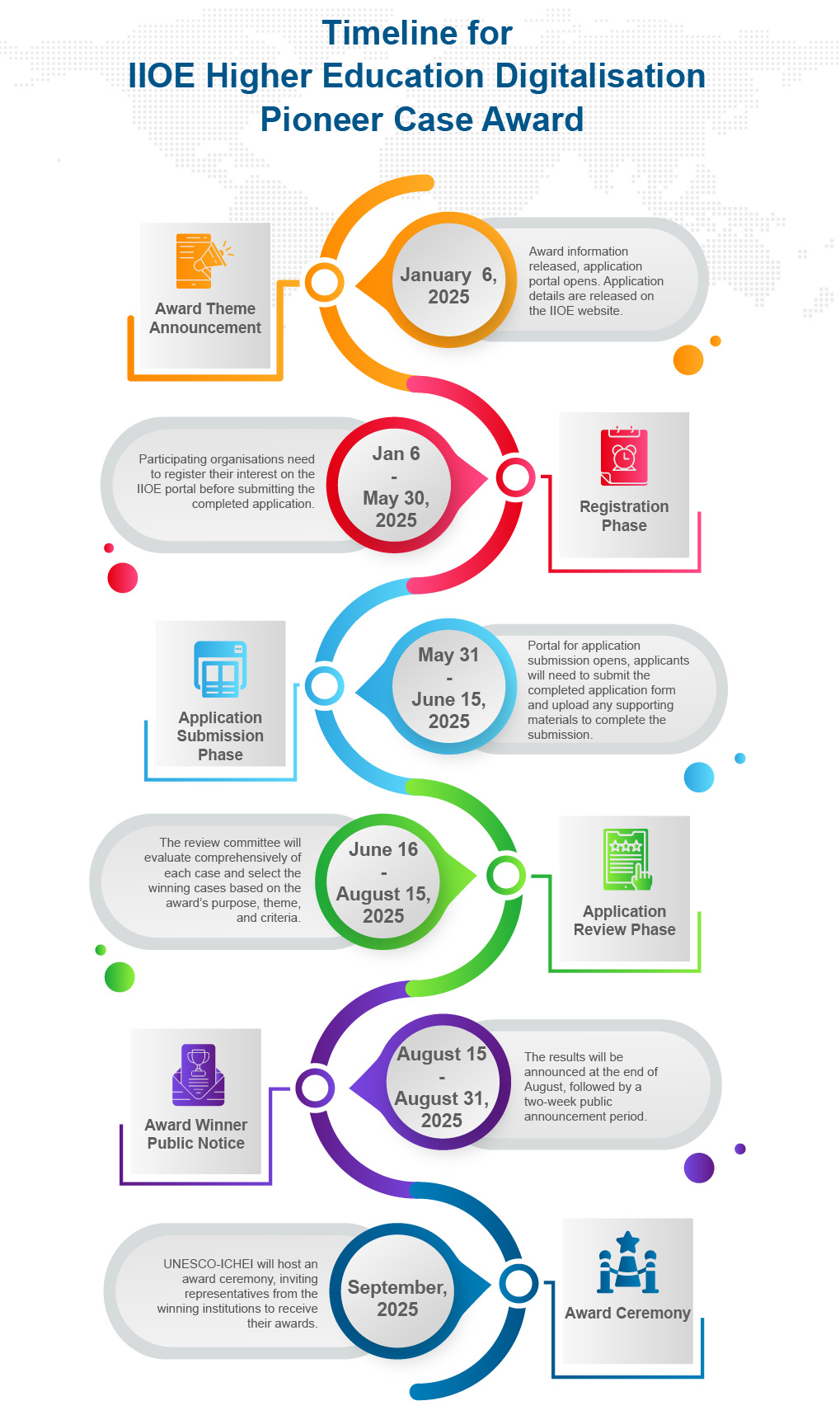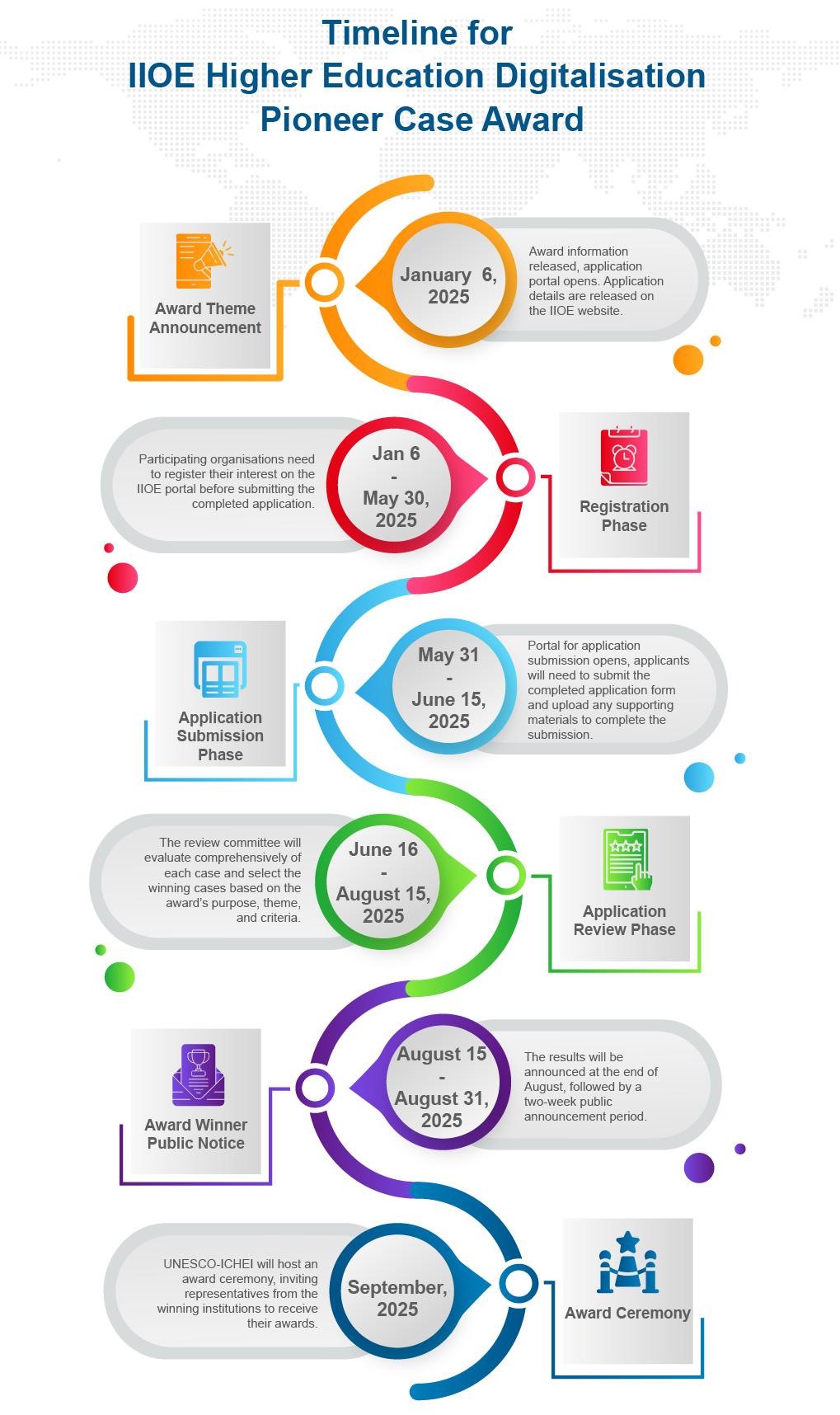Release date:2025.01.06

Activity Details
* Important Notice
If you were unable to complete your registration or submit the required application materials via the IIOE platform before 15 June 2025, please contact the IIOE Secretariat for further assistance. You may also download the application documents from the attachments, complete them, and submit them directly via email to iioe@ichei.org.
Ⅰ. Introduction to the Award
The "IIOE Higher Education Digitalisation Pioneer Case Award" (hereinafter referred to as "the Pioneer Award") is established by the International Centre for Higher Education Innovation under the auspices of UNESCO (hereinafter referred to as "UNESCO-ICHEI") to promote digital transformation of higher education. Iterating with the evolving higher education landscape, the Pioneer Award strives to recognise the latest developments and innovative practices among IIOE partners, and rewards teams and individuals who have made outstanding contributions to this effort. The inaugural Pioneer Award was launched in 2023, themed "The Reform and Innovation of Blended Learning in Higher Education," where 22 laureates from 12 sub-regions worldwide received the Pioneer Award.
The theme of the 2025 Pioneer Award is "IIOE Ecosystem-driven Promising Practices: Empowering Workforce, Innovation, and Collaboration", which aims to recognise achievements of teams and individuals of IIOE partners, who are pioneering IIOE flagship projects to facilitate digital transformation, including but not limited to upskilling the higher education workforce, improving infrastructure to advance digital transformation and professional development, as well as engaging in multi-lateral cooperation to accelerate digital transformation and beyond.
Application Link: https://www.iioe.org/#/microclass/index
Eligible Canditates: Teams or individuals from the IIOE Partner Network, **If your team wish to join the IIOE Network, seek more information from: https://www.iioe.org/#/partner
Number of Awards: 12 awards for IIOE global partners with monetary and honorary incentives, and 10 awards with honorary incentives
Award Incentives: Honorary incentives and/or monetary incentives (CNY70,000 or equivalent USD/ award)
Registration Deadline: May 30, 2025
Application Submission: May 31 - June 15, 2025
Application Language: English or French
How to Apply for the Pioneer Award: Download the application package and complete the required information. Attach any supporting materials along if needed (recommendation letters from at least 1 expert in the field of higher education and educational technology are required)
Ⅱ. 2025 Award Categories
In 2025, UNESCO-ICHEI seeks to identify good practices among IIOE partners that achieve impactful outcomes. Cases in the following areas are considered:
2.1 Developing Digital and AI Competencies through IIOE Micro-certification
The IIOE Micro-Certification Project for Higher Education Workforce Digital Competency Building is an IIOE flagship project focusing on the reskilling and upskilling of the higher education workforce. The project aims to enhance their digital and AI competencies by utilising IIOE courses, platform, and resources and striving for recognition from respective government agencies or HEI supervision departments. This category awards cases that demonstrate the following:
Innovation: Aspiring approach to leverage IIOE Micro-certification to empower the HE workforce by conducting joint programme development, connecting to the IIOE learning platform, or adopting the certification process.
Equity: Promising cases demonstrate customisation and implementation upscale, by building appropriate content and certifications that support local networks and on a large scale.
Inclusion: Solutions that empower women and under-represented groups.
Sustainability: Practices that have established buy-ins from stakeholders, policy recognition or institutional endorsement of the IIOE micro-certifications.
2.2 Enabling localised digital empowerment initiatives through IIOE National Centres
Since its establishment in 2019, IIOE has expanded into a global network of more than 120 higher education institutions (HEIs) across 41 countries in 11 sub-regions, including 12 IIOE National Centres in Africa and Asia. These National Centres have made significant strides in empowering the higher education workforce and advancing the digital transformation of HEIs in their respective countries. The time is ripe for collecting and sharing good practices of IIOE National Centres, and promoting peer learning, thereby inspiring more localised initiatives to emerge. This category is designed to award applicants that establish the following:
Robust network development: Establishing and expanding the national network of HEIs to increase the coverage and impact of localised initiatives and accelerate the digital transformation of higher education through concerted efforts across the country. The network should demonstrate mutual support and knowledge sharing to enhance the overall network capacity.
Effective operation: Leveraging the resources and platform of IIOE and the National Centre to empower the higher education workforce by providing training on digital and AI competencies, organising policy dialogues at the national level, and conducting other customised activities in line with local needs.
Ongoing government engagement: Establishing or reinforcing partnerships with government agencies, aligning the work of the National Centre with national policies and strategies, and contributing to policy formulation regarding higher education development in the digital and AI era.
Active enterprise involvement: Fostering close partnerships with private sector entities to support digital and AI competency building for the higher education workforce and facilitate the digital transformation of HEIs.
2.3 Leveraging Smart Classroom Operations for Teaching and Learning Innovation and Excellence
The Smart Classroom Project is a flagship project of UNESCO-ICHEI. Through cooperation with enterprises, smart classrooms containing hardware and software facilities are donated to universities that need infrastructure to embrace digital technology to enhance their digital education quality. This category aims to award good practices utilising Smart Classrooms to demonstrate:
Quality teaching and learning: Leveraging the Smart Classrooms to allow teachers to create engaging lessons and improve teaching quality.
Inclusive training: Utilising the Smart Classroom to offer online courses, workshops and other resources to assist teachers in upskilling and enhancing knowledge.
Effective integration: Integrating with institution-wide systems for better resource management and data sharing.
2.4 Strengthening Global Industry-university Collaboration for Higher Education Digital Empowerment
Multi-lateral collaboration and public-private partnerships foster the IIOE ecosystem collaboration, where enterprises and the industry play a vital role in building infrastructure, providing training, and accelerating workforce competency-building. This category aims to award enterprises that have made significant contributions or tangible outcomes by cooperating with HEIs in the IIOE ecosystem.
Appropriate Infrastructure: The enterprise provides a comprehensive and advanced smart classroom solution, teaching auxiliary software, or other solutions to IIOE partner universities to upgrade the teaching environment and learning experience, promote teaching method innovation, and improve teaching quality.
Talent Cultivation: The enterprise actively cooperates with IIOE and offers complete enterprise certification training courses covering theoretical knowledge and practical skills. This ensures that teachers enhance their capabilities and students gain strong employability after obtaining the certification.
Teacher Empowerment: The enterprise designs and provides comprehensive, systematic, and practical tutorials for IIOE partners.
Ⅲ. Application Stages and Timeline

3.1 Important Dates
Jan 6, 2025: Award Theme Announcement.
Jan 6-May 30, 2025: Registration Phase
May 31-June 15, 2025: Application Submission Phase
June 16 - August 15, 2025: Application Review Phase
August 15 - August 31, 2025: Award Winner Public Notice
September, 2025: Award Ceremony
3.2 Requirements
Eligible applicants must fill in the application form and upload relevant supporting materials through the IIOE online platform before the application deadline. Submitted documents need to include:
Application form, including the project introduction, implementation plan, evidence and impact of implementation
Recommendation letter, signed by at least 1 expert in the award discipline or leadership from the project institution recognising the practice’s validity, and/or alignment with the institutional, regional or national priorities.
3.3 Disqualifications include but are not limited to the following
Plagiarised materials: cases of plagiarising other people's achievements or works in the application materials.
False application: False information, falsified data or falsified facts in the application materials.
Incomplete application: The application materials do not meet the application requirements, or are missing required information, etc.
Duplicated application: Applications submitted multiple times will only be considered once based on the latest submission date.
Exceeding the scope of application: The application project does not belong to the scope of evaluation and is inconsistent with the evaluation theme and objectives of this award.
3.4 Screening Stage
The award application materials are submitted to the award secretariat, and the secretariat will desensitise the relevant information such as institutions and individuals in the application form to ensure the fairness of the selection.
Information masking: The application materials need to be partially masked. Identifiable information of individuals or institutions, such as names, contact information, etc., will be anonymised in the application materials so that applications cannot be identified to specific persons or groups. National or regional information will not be masked to provide the applicant's regional background.
The award secretariat will conduct a preliminary screening (blind evaluation) of the masked application materials to eliminate applications that do not meet the selection criteria.
The application materials that pass the preliminary screening will enter the expert review process, and the review experts will evaluate and score the application materials, provide professional opinions and suggestions, and share them back to the award secretariat for summary.
3.5 Application Review and Evaluation and Awards Stage
Based on the scoring and evaluation from the reviewing experts, the review committee will then comprehensively evaluates the applicants based on factors such as the impact, regional-representation and etc., and give the final award evaluation results.
The Pioneer Award results will be listed for public notice in August, and the Pioneer Award Ceremony will be held in September, 2025.
Ⅳ. Awards Review Team
The review team consists of the review committee and the secretariat.
4.1 Review Committee
Main responsibilities: Formulate evaluation rules, perform evaluation work, and confirm evaluation results.
4.2 Review experts
Main responsibilities: According to the evaluation standards and procedures, comprehensively evaluate and score the candidates, and provide professional opinions and suggestions.
4.3 Secretariat
Main responsibilities: Responsible for the daily operation of the award, including the establishment and maintenance of the evaluation expert database; the organisation and promotion of the award; the organisation and coordination among consulting experts; the implementation of the award announcement ceremony, and the dissemination of promising practices; the organisation of knowledge and practice sharing between the award-winning teams and individuals, etc.
4.4 The Committee Review Mechanism
The review committee members should be rotated according to the disciplinary expertise of the field and the actual work situation, and a certain proportion of new members should enter the review committee each award term to ensure the continuous renewal of review experts.
When the reviewing committee takes in new members, attention should be paid to regional balance, gender balance and representativeness, and more experts from developing countries should be encouraged to participate in the review work.
The evaluation of this award will follow the principles of regional representation and diversity, and fully consider regional balance and gender balance factors when awarding.
The award secretariat will publicise and notify the winners to ensure the fairness and credibility of the review process, and plan and implement the awards.
The secretariat promotes award-winning projects and experiences to expand the influence of the awards.
Click to review the 2023 Pioneer Award: https://www.iioe.org/#/news/detail/e2671e0c-9cbf-447d-9640-f8683e2039f1/0





